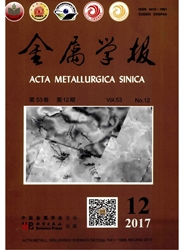

 中文摘要:
中文摘要:
研究了不同处理温度(300,400和450℃)、不同超声功率(400,600和800W)以及不同处理时间(3,5,7和10min)对Pb-20%Sn合金电阻的影响.结果表明,超声处理对Pb-20%Sn合金熔体的电阻有显著的影响.超声作用使熔体电阻瞬间减小,停止超声作用后,电阻瞬间增大,但并未恢复到初始值,与初始电阻相比有一个减小量,该电阻维持一段时间后才缓慢恢复到初始值.超声功率越大,超声作用效果越显著,电阻瞬态变化量和持久性变化量越大,有效时间也越长.随着温度升高,电阻瞬态变化量和持久性变化量均增大,超声作用有效时间先增大后减小.随着超声作用时间的延长,超声作用效果逐渐增大,但存在一个饱和作用时间.
 英文摘要:
英文摘要:
The changes of Pb-20%Sn alloy melt's electrical resistance under different temperatures(300,400 and 450 ℃),different ultrasonic powers(400,600 and 800 W) and different treatment times(3,5,7 and 10 min)were investigated.The results show that the ultrasonic treatment has a strong influence on the melt's electrical resistance.When the ultrasonic treatment is applied,the electrical resistance decreases immediately;after the ultrasonic treatment is removed,the electrical resistance increases instantly,but it does not reach its initial value.There is a difference between this electrical resistance and the initial value.This electrical resistance will remain constant for a long time,and then slowly increases to the initial value.The stronger the ultrasonic power is,the more significant influence the ultrasonic treatment will exert,the larger the transient variation of resistance(ΔR) and persistent variation of resistance(Δr) will be,and the longer the effective time will be.With the temperature increased,bothΔR and Δr will increase,and the effective time will increase at first and then decrease.With the extension of ultrasonic treating time,the ultrasonic effect will increase gradually,but there is a saturation treating time.
 同期刊论文项目
同期刊论文项目
 同项目期刊论文
同项目期刊论文
 Numerical simulation of acoustic pressure field for ultrasonic grain refinement of AZ80 magnesium al
Numerical simulation of acoustic pressure field for ultrasonic grain refinement of AZ80 magnesium al Effect of ultrasonic power on grain refinement and purification processing of AZ80 alloy by ultrason
Effect of ultrasonic power on grain refinement and purification processing of AZ80 alloy by ultrason Effect of homogenization treatment on microstructure evolution and the distributions of RE and Zr el
Effect of homogenization treatment on microstructure evolution and the distributions of RE and Zr el A new method of semi-continuous casting of AZ80 Mg alloy billets by a combination of electromagnetic
A new method of semi-continuous casting of AZ80 Mg alloy billets by a combination of electromagnetic 期刊信息
期刊信息
